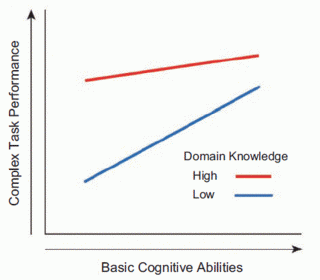Career
Hard Work Beats Talent (But Only If Talent Doesn’t Work Hard)
Hard work vs. talent: Who wins?
Posted October 8, 2011 Reviewed by Ekua Hagan
In a world where we are ridiculously overcommitted to making sure everyone is equal in every way, a new study just published in Psychological Science contains some sobering news you might not like.
In their paper "Limits on the Predictive Power of Domain-Specific Experience and Knowledge in Skilled Performance," David Hambrick and Elizabeth Meinz kill the myth that talent doesn't matter. We would love to believe, of course, that all we need to do to be the best is to try hard enough. You can be anything you want as long as you really want it: rocket scientist, pop icon, sports hero. There is no shortage of popular pundits promoting this myth.
As Hambrick and Meinz point out:
Malcolm Gladwell (2008) commented that '"The relationship between success and IQ works only up to a point. Once someone has reached an IQ of somewhere around 120, having additional IQ points doesn't seem to translate into any measurable real world advantage" (pp. 78-79). In his own bestselling book, The Social Animal, David Brooks (2011) expressed the same idea: "A person with a 150 IQ is in theory much smarter than a person with a 120 1Q, but those additional 30 points produce little measurable benefit when it comes to lifetime success" (p. 165). Malcolm Gladwell and David Brooks are simply wrong. At least in science, a high level of intellectual ability puts a person at a measurable advantage—and the higher the better.
The people peddling this notion that talent is irrelevant often cite a 1993 paper by Ericsson, Krampe, and Tech-Romer regarding deliberate practice in which the researchers argue that success is usually built upon purposeful, thoughtful and intense efforts to improve performance over about 10,000 hours.
This is true; hard work does pay off. The Beatles got to be so good because they had to perform their music four hours a day (eight days a week) during their two-year stint in Hamburg. Bobby Fischer became a grandmaster at chess after years of honing his skills at the Brooklyn Chess Club.
But that wasn't the question. What we want to know is whether hard work makes talent irrelevant. Will every group that jams together for 10,000 hours become the Fab Four and every chess obsessed child become a world champion?

Hambrick and Meinz showed the basic relationship between hard work and talent in this chart. The vertical axis measures your level of performance. Higher up means spectacular. The horizontal axis charts your innate talent — in this case, cognitive ability or what the rest of the world refers to as "intelligence." Further to the right means super smart. The two lines refer to different levels of deliberate practice. The red line refers to those who have put in the hours while the blue refers to those who haven't made the effort.
There are two things to take away from this. The first is that being smart is a useful thing to inherit, right up there with a large trust fund. The more smarts you have, the higher your performance. And despite what Gladwell and Brooks say, intelligence's benefits don't disappear; the more innate talent of any sort you have, the better off you are going be.
If you take a careful look, however, you will notice that those of us with more modest abilities do have a chance. Even if you weren't born with genius in your genes, you can outperform the smartest of individuals as long as you work hard and the latter doesn't. Also, the differences between the smart and the not-so-smart shrink quite a bit if they both work hard. That means that talent still counts, but hard work puts you right up there.
Unless you are in a profession where there can only be one winner, like going for Olympic gold, this is pretty good news. With hard work, at the bare minimum you can be good at what you do. And though you might never be the best, you can give the best performers a run for their money. On the other hand, if you have chosen a career where only the very, very best succeed, you better be born with a lot of talent.
Necessarily, people who are exceptionally talented are also exceptionally rare. But from what we know about the prevalence of procrastination, people who work hard are also pretty rare too. Most of the time, you are going to end up competing against rivals with one of these attributes, talent or hard work, not both. Those with natural aptitude and the willingness to put in the effort are as rare as diamonds and twice as valuable. If you see one, take a picture, get an autograph, and wish them good luck. This world has problems and we especially need people like them.
As for us mortals, let's take one more look at the chart. Is it better to be hardworking with modest talents (the low end of the red line) or smart but lazy (the high end of the blue line)? The answer is cut and dried: Hard work wins out.
I told you might not like the news. But if you are ready to work hard, to change procrastination into motivation, you now know where to get started. Just look at the title of this post.
Want to learn more about yourself? Take one of our online surveys on different aspects of your personality and get immediate feedback.




